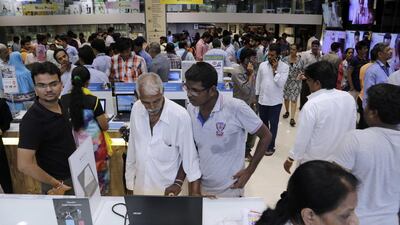Diwali, the Hindu festival of lights, was already over for this year when the World Bank unexpectedly lit up the Indian government’s self-approval quotient. India jumped 30 rungs higher on the WB’s Doing Business index of 190 countries. Suddenly, a country in which the business climate is often likened to an elephant – huge, blundering and ponderous in gait – appeared to be acquiring a positively tigerish aspect.
According to the official narrative, with the world's seventh largest GDP and ninth largest stock market, India is transitioning before our eyes and the world is taking notice. Prime minister Narendra Modi's administration has gone into overdrive, trumpeting the country's new improved position as a consequence of reforms on his watch. India, Mr Modi's supporters say, is now infinitely more attractive to investors and entrepreneurs.
The prime minister’s critics have offered a grumpy response, citing two other foreign rankings that tell a less festive story. The World Economic Forum’s latest global gender gap report places India 21 spots lower at 108, far below the global average and far behind China and Bangladesh. The International Food Policy Research Institute’s global hunger index, meanwhile, ranks India 100th out of 119 countries.
The reality is that all three rankings constitute 21st-century India’s reality. Mr Modi’s government has undoubtedly eased some regulations, loosened foreign investment controls, reduced export-import taxes and projected a welcoming message to overseas investors. But India is also beset by gender inequality and is the third hungriest country in Asia, with only Afghanistan and Pakistan ranking worse.
The naysayers are right to point out the dark, unlit corners in Mr Modi’s showy claims of an India remade. But it is only fair to note that any measure of India must focus on business just as much as on hunger and gender disparity.
_________________
Read more from Opinion
Saad Hariri’s resignation was a shock, but what will happen next?
Finding news has never been easier. Finding information we can trust is much more difficult
Why the education sector could learn a lot from Netflix
_________________
So just how easy is it to do business in India today? Even the World Bank rankings, much derided as a good news story by Mr Modi’s critics, are restrained. After talking to local experts, including lawyers, accountants and freight forwarders, the organisation determined it would take 1,445 days to enforce a contract in Mumbai’s civil court. This is more than double the time needed in a high-income Organisation for Economic Co-operation and Development (OECD) country and a staggering 1,281 more days than it would in Singapore. Starting a business in India takes almost an entire month, compared with half a day in New Zealand. And so it goes on. Everything – from getting a construction permit to paying taxes – is slower in India, according to the World Bank index, and that’s just the relatively positive, if distant, view taken by an international financial institution.
Interestingly, the Indian media, which is often sympathetic to Mr Modi, has highlighted case studies that show the gap between the index and reality on the ground. The most striking of these is former commercial pilot Amol Yadav’s attempt to register his indigenously-built, six-seater aircraft prototype with India’s director general of civil aviation. It took six years for him to get nowhere. Ultimately, it was only the involvement of a leading regional politician and then of the prime minister that allowed the entrepreneur to cut through multiple layers of inimitably Indian red tape.
And yet, there is some evidence of change, if only in the search for a way forward. For instance, there is the first indigenous enterprise survey of Indian states, which was published in August. Vivek Dehejia, who jointly led research on the report, says it identifies basic, easily fixed issues that bedevil business ventures in India. Mr Dehejia is a senior fellow at Mumbai’s IDFC Institute, which styles itself an “independent public policy think/do tank”. IDFC worked with the Indian government to survey 3,276 manufacturing firms across the country. The resulting report is rich in granular detail in a way the World Bank index is not.
_________________
Read more on India
India's demonetisation was a trigger for India’s digital payments industry
India still scarred a year after Modi's demonetisation move
India targets shell companies in black money crack down
_________________
For instance, it found that only 20 per cent of manufacturing start-ups used the single-window facility to set up shop, mostly because they didn’t know about it. The report also highlighted the immense problems faced by labour-intensive sectors in finding skilled workers and in hiring and firing contract labour, as well as the productivity losses they suffer due to incessant strikes and lockouts. The enterprise survey trenchantly noted the preponderance of small companies in India, as compared to China, and the resulting consequences for competitiveness, efficiency and growth. The locally prepared report does not offer a ranking of Indian states but a clear way forward for any Indian government willing to follow through.
At this point, it's not clear if Mr Modi can or will do so. He has rejected criticism of two key, but ineptly handled, economic reforms. The "demonetisation" drive of exactly a year ago voided 86 per cent of the banknotes in circulation overnight. And a supposedly simplified national goods and services tax is proving hellishly complex.
But at least there is the oft-stated intention to make India more business-friendly. That is an advance.

